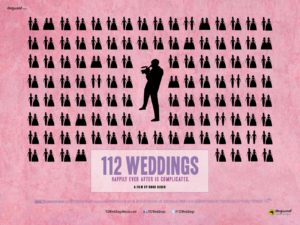 “What is it about signing on that dotted line that changes everything?”
“What is it about signing on that dotted line that changes everything?”
This question is posed about halfway through “112 Weddings,” a fascinating and intimate documentary by New York-based filmmaker Doug Block. The film, recently featured in a special screening by the Twin Cities Film Fest, explores the ideas, expectations, and realities of marriage.
Mr. Block, whose long-running day job has been a wedding videographer, decided after 20 years to follow-up on the couples whose nuptials (all 112 of them) he was hired to film.
Selected couples were interviewed, with the footage of their weddings interwoven with testimonials of the years since. The results were intimate, deeply personal, funny, heart-wrenching and, above all, very real. Some couples were still happily married; some bitterly divorced. Some had children, others became mired in depression, illness, and drug abuse. All thought they knew what they were in for.
“Happily ever after,” one respondent recalled, “is complicated.”
What is so captivating about the film is that each relationship was initially captured at a blissful apex. The flowers, the romance, the family, the dancing, the absolute joy, reminiscent of a ship’s maiden voyage. Indeed, the day itself is something of a dream; a celebration, to be sure, but more than that, a fantasy that this is what life will be like, hugs and kisses and gifts and everything wonderful.
But then, inevitably, life happens.
There was the couple whose marriage was suddenly tested by their 3-year-old daughter’s diagnosis of leukemia. The husband and wife, each one of several siblings, who had wished for more than one daughter. The Hollywood screenwriter whose substance abuse and manic depression proved insurmountable for his marriage. A bitter divorce, after a 19-year marriage, after a husband’s year-long affair was discovered: “I haven’t been happy for a long time,” he shockingly revealed during a couples’ therapy session.
Not all the stories depicted a fall from grace. One couple, put off by the “contractual” or “ownership” sense of a marriage, chose to perform a “partnership ceremony” instead. Their “free spirit” journey started non-traditionally, but continued on in a most ideal way. Happy, healthy, and with two teenage daughters, the couple decided, after 15 or so years, to finally get married.
Also featured throughout was a soon-to-be-married couple, whose preparations, excitement, and trepidations leading up to the Big Day were poignantly interwoven with the stories of Life After it.
What is the idea of marriage? Why is it so important? How do we face the inevitable challenges of a contract for life-long partnership? And why are we so confident in an institution whose likelihood of success, as Mr. Block put it, isn’t much better than the flip of a coin?[1. It is often referenced in the film that, according to numerous sources, about 50% of marriages in the United States end in divorce.]
The movie could easily be titled “112 Births,” as you realize you’re watching the beginning, middle, and end of a living, breathing marriage. I loved the element of time-travel, the simultaneous starts and finishes, the polarity of expectation and disappointment, and everything in-between.
Perhaps the most insightful commentary came from a New York rabbi who himself had officiated over 100 weddings.
“Weddings are great because you throw a bunch of money at them and there’s liquor,” the rabbi quips. “But marriages often don’t work out because you throw a bunch of money at them, and there’s liquor.”
email me at [email protected]


